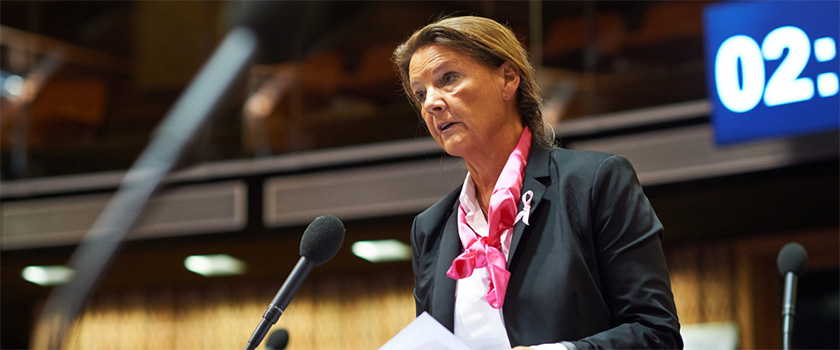
Head of the Norwegian Delegation to PACE, Ingjerd Schou. Photo: Council of Europe.
Suspected corruption-like activity in PACE
A report published on 22 April has concluded that the Parliamentary Assembly of the Council of Europe (PACE) has organisational weaknesses that leave it vulnerable to corruption. The report concludes that there are reasons to strongly suspect that corruption-like activity has taken place.
The report of the independent investigation body.
The report also emphasised a serious lack of transparency, relating particularly to processes involving the appointing of rapporteurs and other positions of trust in the organisation. Further, it highlights the need for continued improvement of the organisation’s ethical guidelines and, not least, its members’ level of respect for those guidelines.
Azerbaijan
The report was prepared in response to allegations of corruption in connection with election observation missions and human rights and democracy reporting in Azerbaijan.
The investigation body has not had the opportunity to subject the instances of corruption-like activity listed in the report to a judicial investigation but encourages national authorities to follow up appropriately the instances mentioned in the report.
In addition, all presidents of national parliaments in the Council of Europe’s member countries have been asked to thoroughly review the report to assess the need for national monitoring activities, also beyond the purely legal aspect. All parliamentary presidents in the Council of Europe will be provided with a copy of the report.
“Very serious”
“The report’s conclusions are very serious; it is important not to think that the work is done now. To the contrary, this is when the critical effort begins,” says the head of the Norwegian Delegation to PACE, Ingjerd Schou.
The report was discussed on the session’s first day, Monday 23 April. Several of those participating in the debate echoed Ms Schou’s sentiments and emphasised that the rules for nomination and appointment to offices and other positions need to be reviewed both at the national level and in PACE.
The comprehensive investigation has been ongoing for almost ten months. The independent investigation body consisted of Sir Nicolas Bratza (former president of the European Court of Human Rights, from the United Kingdom), Jean-Louis Bruguière (former judge with experience from anti-terror cases, from France) and Elisabeth Fura (former judge from the European Court of Human Rights in Strasbourg, from Sweden).
Together with its Nordic and Baltic colleagues, the Norwegian delegation has been a strong advocate for an investigation into the allegations, demanding that the investigation must be backed by a strong mandate and that it must be built on the basic principle of independence of the Assembly. Several members of the Storting’s delegation to PACE have also contributed to the report through talks with the external investigation body.
Last updated: 26.04.2018 15:07